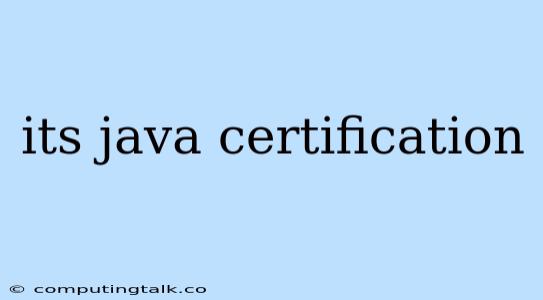Obtaining a Java certification can be a valuable asset for any software developer or aspiring programmer. It demonstrates a strong understanding of the Java programming language and can increase your employability in the competitive tech market. But with numerous certifications available, it can be daunting to choose the right one for your career goals.
What are Java Certifications?
Java certifications are standardized assessments that test your knowledge and skills in the Java programming language. They are offered by various organizations, including Oracle, the creators of Java. These certifications generally cover core Java concepts, such as object-oriented programming, data structures, algorithms, and exception handling.
Why Get a Java Certification?
There are several compelling reasons to consider obtaining a Java certification:
- Enhanced credibility: A Java certification validates your expertise to potential employers, demonstrating that you possess the required knowledge and skills.
- Increased job opportunities: Many job postings in the software development industry specifically require or prefer candidates with Java certifications.
- Higher salary potential: Certified Java developers often command higher salaries than those without certification.
- Career advancement: A Java certification can help you progress in your career, opening doors to senior developer roles, architect positions, and other leadership opportunities.
- Personal growth: The process of preparing for and taking a Java certification exam can help you deepen your understanding of the language and enhance your problem-solving abilities.
Which Java Certification Should You Choose?
Selecting the right Java certification for you depends on your current skill level, career goals, and areas of interest. Here are some of the most popular Java certifications:
- Oracle Certified Associate, Java SE 11 Developer: This entry-level certification validates your fundamental knowledge of Java SE, including core language concepts, data types, control flow, and object-oriented programming.
- Oracle Certified Professional, Java SE 11 Developer: This advanced certification builds upon the Associate level, covering topics like generics, collections, concurrency, and lambda expressions.
- Oracle Certified Master, Java SE 11 Developer: This prestigious certification is designed for experienced Java developers and requires a deep understanding of advanced Java concepts and best practices.
- Oracle Certified Associate, Java EE 7 Web Component Developer: This certification focuses on developing web applications using Java Enterprise Edition (EE) technologies, including servlets, JSP, and JavaServer Faces (JSF).
- Oracle Certified Professional, Java EE 7 Web Component Developer: This advanced certification covers advanced web development concepts, such as security, database integration, and web services.
How to Prepare for a Java Certification
Preparing for a Java certification exam requires dedication and a structured approach. Here are some tips:
- Review the exam syllabus: Carefully study the official exam syllabus provided by the certification body to understand the topics covered.
- Take practice exams: Practice exams are an excellent way to assess your readiness and identify areas that need further review.
- Enroll in a training course: Consider enrolling in a training course or bootcamp designed specifically for Java certification preparation.
- Build real-world projects: Applying your Java knowledge to real-world projects can reinforce your understanding and help you prepare for practical exam questions.
- Join online communities: Participate in online forums and communities dedicated to Java developers to learn from others, ask questions, and gain valuable insights.
Tips for Passing a Java Certification Exam
- Stay calm and focused: Avoid rushing through the exam, and take your time to read questions carefully.
- Manage your time effectively: Allocate sufficient time for each section of the exam and avoid spending too long on any single question.
- Apply your knowledge: The exam is designed to assess your practical understanding of Java concepts. Apply your knowledge to solve problems and answer questions.
- Use elimination techniques: If you are unsure of the correct answer, try eliminating unlikely choices to narrow down the options.
- Review your answers: If time allows, revisit your answers and make sure you have not made any careless mistakes.
Conclusion
Obtaining a Java certification can significantly enhance your career prospects in the software development industry. It demonstrates your commitment to professional growth and provides a valuable credential that can open doors to new opportunities. By carefully choosing the right certification, preparing effectively, and following the tips above, you can increase your chances of success. Remember, the journey to becoming a certified Java developer requires dedication, perseverance, and a genuine passion for the language.
